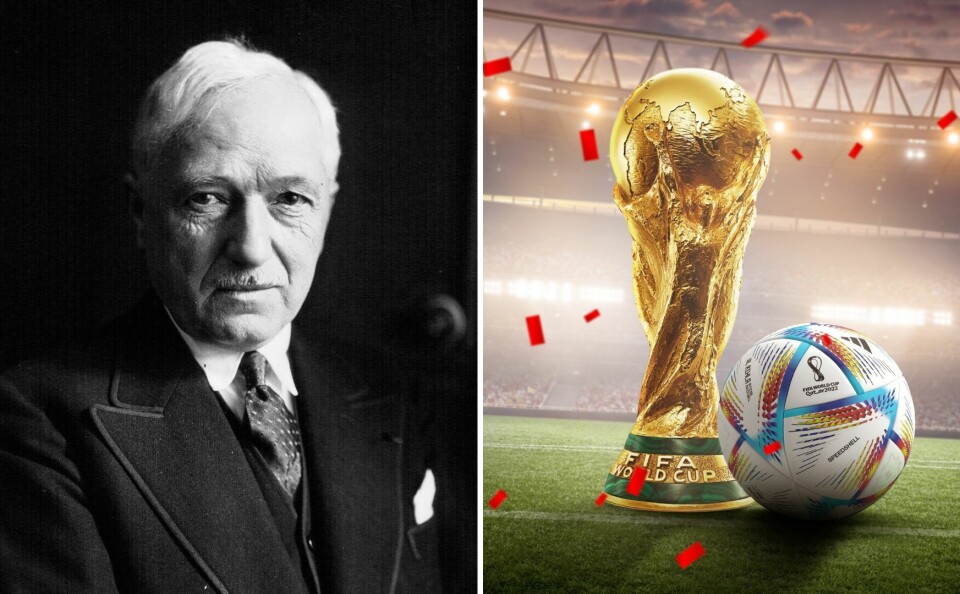-
Rugby vocabulary to know if watching the Six Nations in France
From un tampon to une cathédrale, understand the meaning of key French rugby terms
-
The five other capitals of France before Paris
Several other cities have held the honour for various reasons
-
Saint-Aubin-des-Châteaux: rural French village with historical and natural charm
Step back in time to explore Neolithic, Roman, and Templar traces... but you will not find any châteaux
Did you know? Football fans have French to thank for World Cup
How two Frenchmen founded one of the most popular sports competitions in the world

The FIFA World Cup tournament as it is known today, was invented and theorised by Frenchmen Jules Rimet and Henri Delaunay around the 1920s.
It was intended to create an official competition for football players under an organisation that guaranteed professional status after Olympic games organisers’ gave a restrictive definition of amateurism.
Read more: Paris Olympics 2024: How can I become a volunteer?
Other competition ideas were considered
FIFA, an organisation that was created in 1904, reunited under a supervision committee in 1927 to study three plans on the structure behind what would later become the most popular sports competition in the world.
Projects included a European competition, another competition with football players under amateur status and Mr Delaunay’s, a competition under the supervision of FIFA, said Paul Dietschy, a professor of contemporary history at Sciences Po and the author of a lengthy book on the history of football.
“Delaunay won because FIFA wanted to cater to the universalism ideology,” said Mr Dietschy, according to archives he consulted.
“Is it a coincidence that two French people founded it?” said Mr Dietschy, asking a question to himself during the interview.
“France has played a huge part in structuring international sports between both world wars thanks to universalism values,” said Mr Dietschy.
Read more: France Qatar 2022: Minister sends LGBTQ+ message with rainbow jumper
Opportunity to make money for FIFA
But FIFA had to struggle against the International Olympic Committee which looked to include football among the list of sports at 1928’s Amsterdam Olympic Games.
Looking to Great Britain and its solid professionalism culture, Mr Delaunay and Rimet both concluded that football having its own competition was an opportunity to keep earnings for the federation, said Mr Dietschy.
The first FIFA World Cup was held in – and won by – Uruguay in 1930 with 13 countries having responded favourably.
Belgium, France, Romania and Yugoslavia were the only four European countries with the others coming from Northern, Central and South America.
The event was a sports accomplishment, attracting nearly 550,000 spectators over the 18 games. The next FIFA World Cup in Italy in 1934 had 16 teams.
Awarded the Legion d’Honneur but not Nobel Peace prize
Subsequent FIFA’s presidents pursued Mr Rimet’s desire to expand the World Cup across all continents, increasing the number of teams and games over the next World Cups.
Qatar’s edition in 2022 was the last to include 32 teams, as FIFA’s 2026 World Cup will be the first one with an all-time high of 48 teams and 80 games.
It will be jointly hosted by the United States, Canada and Mexico.
Both Mr Delaunay and Mr Rimet were awarded the Legion d’Honneur for their contribution to international sports.
Mr Rimet was suggested for the Nobel Peace prize in 1955 but his candidacy was rejected. The prize was, however, not awarded that year.
Related articles
Photo: French-Moroccan comic’s half and half supporter top
French football phrases you may hear in England-France World Cup game
Qatar 2022: President Macron says ‘sport should not be politicised’
























